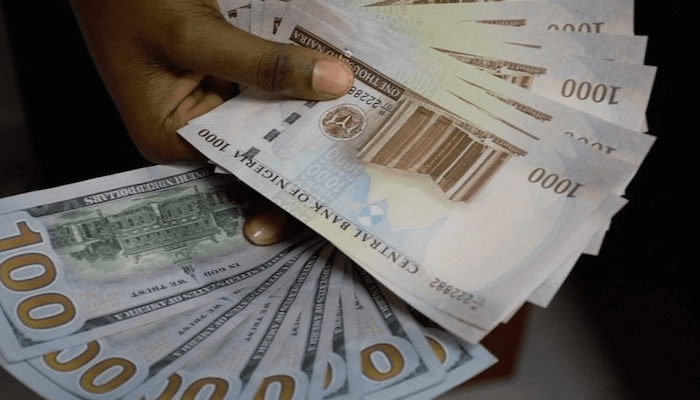A combination of factors from the falling naira to rising inflation are taking a toll on the purchasing power of most Nigerians, restraining their investment appetite.
The pressure on the foreign exchange (FX) has persisted as it recorded an all-time low of N1,348.63 per dollar at the official market on Monday.
After trading on Tuesday, naira weakened by 33.87 percent as the dollar was quoted at N1,348.63, weaker than N891.90 quoted on Friday at the Nigerian Autonomous Foreign Exchange Market (NAFEM), data from the FMDQ indicated.
Nigeria’s currency hit an all-time low of N1,460 against the US dollar, edging close to the N1,500 mark in the face of a severe dollar shortage in the parallel market.
Read also: The naira’s painful journey to the bottom in two charts
Nigeria’s inflation accelerated to 28.92 percent in December 2023 from 28.20 percent recorded in November, showing a record 20-year high since January 2003.
“The depreciation of the naira reduces the worth of your savings in dollar terms,” Ayodeji Ebo, managing director/CBO, Optimus by Afrinvest, said.
He said with the persistent decline in the value of the naira, it’s advisable to have a sizable portion of your investment in dollars.
“For instance, if you had converted N1,195,000 to dollars and invested at the beginning of the year at N1,195/$1.00 for $1,000, the value of your investment in naira terms, excluding interest on investment, will be N1,405,000. That is a 17.6 percent return as of Friday, January 26, 2024,” Ebo said.
With a year–to–date return of 39.9 percent on the Nigeria Stock Exchange one will expect that it is flooded with Nigerians, inflation, and cost of living crises have evaded many of such profits.
Lisa Esifiho, a writer, said that after spending on basic needs, there is barely enough to invest.
“I don’t invest because after spending on my basic needs like food, I barely have enough to invest. Apart from financial constraints, I’ve always witnessed people around me lose their money to the wrong investment, and I’m scared of losing money too,” she said.
Though the stock market is currently dominated by local investors most of its gains reflect Nigeria’s richest men and pension funds.
Last year Nigeria’s inflation increased every month to 28.9 percent in December, a 20-year high according to CBN from 21. 82 percent in January.
Read also: As Naira continues free-fall, all CBN offers is more promise to act
The surging inflation was fueled by several factors such as the removal of fuel subsidy in June last year, the devaluation of the naira and costly food distribution among others.
As the cost of living continues to rise in Nigeria, many individuals and families find themselves grappling with the challenge of managing their finances amidst increasing expenses.
The World Poverty Clock estimates there are now approximately 66 million Nigerians living in extreme poverty.
“People aren’t investing in Nigeria for obvious reasons. If naira keeps falling, there’s no incentive to keep your assets here. Also, people save or invest what is left after meeting basic needs. If they’re not investing, it means nothing is left to save or invest,” Boluwaji Davids said in a post on X.
Naira devaluation also affects Nigerians in the diaspora’s ability to invest in Nigeria. Budget Odogwu, a Nigerian in the diaspora shared his experience of losing $3000 after investing in real estate in Nigeria.
“Land doesn’t appreciate in Nigeria. The land I bought for N5 million in early 2020 is worth N15 million now. I should be happy, right? But, I remember transferring the dollar equivalent in BTC to my broker who sent the payment in naira. Now, the equivalent of what the land is worth in dollars is roughly $11,200. I lost $3ooo in 4 years,” he said in a post on X.
The naira since June after the devaluation has lost more than 40 percent of its value against the dollar, the biggest loss over that period among currencies tracked by Bloomberg.
The value of the naira, reached an unprecedented intraday rate of N1,399 per dollar at the official market on Thursday.
Similarly, Nigerians trying to invest in foreign assets face very high exchange rates, hence deterred from such investment.
“Imagine exchanging naira for dollars at N1360/$ to buy a foreign stock, an amount that would have bought more stocks some years ago. It makes dollar cost averaging hard as a Nigerian because the naira continues to depreciate,” Bunmi Sofowore, a realtor said.
Aside from a low disposable income, some Nigerians also avoid investing owing to a lack of knowledge and fear of losing money.
Read also: Naira slump: Manufacturers brace up for general price hikes
Adetu Olayinka, a cultural writer said he preferred to invest in a business which he is saving for.
“I haven’t started investing, but I am saving up to invest in a business with a friend. Stocks have high risk involved and except one diversifies across countries and industries. It’s not something I think I want to venture into now,” he said.


















